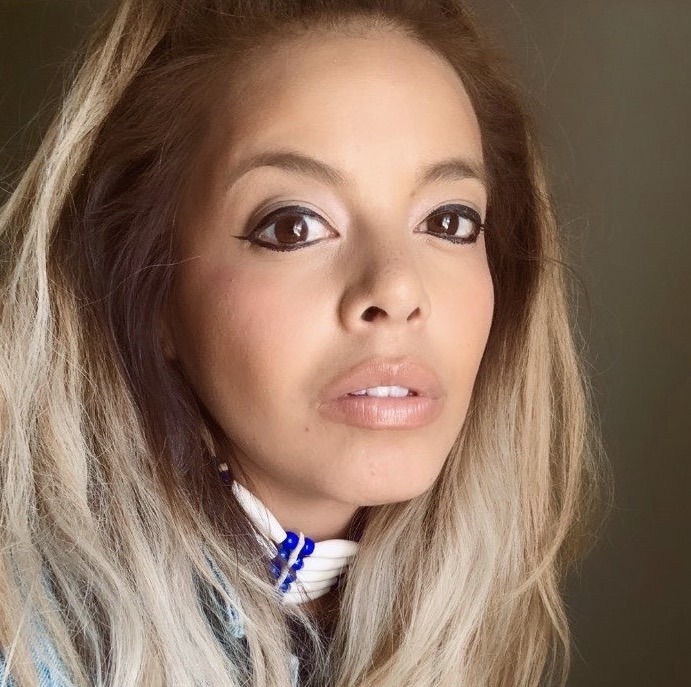Kim Senklip Harvey, who wrote Kamloopa: An Indigenous Matriarch Story, is a proud member of the Syilx, and Tsilhqot’in Nations with Ancestral ties to the Dakelh, Secwepemc and Ktunaxa communities. She is an Indigenous Theorist and Cultural Evolutionist who uses a variety of modalities including playwrighting, tv writing, blog and podcasting to work towards the equitable treatment of her peoples. She imbues her creative work in all these forms with genuine enthusiasm and contagious zest for life.
2021 has been another extremely busy year for Kim. She had just completed her Masters in Creative Writing from the University of Victoria, when she found out that Kamloopa had won the prestigious Governor General’s Award for Drama. Kim, reported in a recent CBC interview, that her response when she found out was to weep because: “as an Indigenous woman, working in a sector that is not built for me, writing and working and creating is difficult, and any success for an Indigenous person or racialized person is a big deal. The work is much and it felt like a moment of respite, a moment of nourishment, a moment when the system finally said we appreciate, respect and would like to celebrate what you are doing. In a career that has been much of a battle, it kind of felt like a relief, like I could take a seat for a minute and get my bearings. “
The announcement of the Governor General’s Award came in the same week that Tk’emlúps te Secwépemc First Nation discovered the remains of hundreds of children’s bodies at a former residential school in Kamloops, BC. When asked about this in a CBC Radio Interview in June of this year, Kim replied that: “I come from the Syilx Nation, which is 30 minutes from that residential school. I had family members attend there and other residential schools. And the emotionality of it is that I’m the first generation in my family to not attend residential schools. And in one generation, this is what’s possible. And I think it is complicated this week in terms of honoring those children who weren’t given the opportunities to have a full life. And that I am in service and live a full life out of respect to them and their families.”
This could be considered a heavy weight to bear, but Kim’s work (as you will see in Kamloopa) processes this legacy through comedy. Kim has often said that her aim in writing Kamloopa was to make her mother laugh, because life is often dramatic and depressing enough and: “I firmly believe that real transformation is going to happen when we’re sitting and laughing, and relating, and we’ll swing between tragedy, and hurt, and pain, and end with a joke. And I say that some of the funniest jokes I’ve ever heard have been at an Indigenous funeral, bar none. Indigenous people’s resilience to find joy in some of the most intense emotional situations reminds me that it’s in us, and if I’m going to write for my people, we want to be laughing, like my mom wants to come to a show and laugh. The first time she laughed at Kamloopa, I was like, “YUSS!””
From WAM’s earliest conversations with Kim about producing Kamloopa, we readily agreed to her request that the production center the work of BIPOC women and non-binary people – not just on stage but in the rehearsal room and designing the environment. She told the story of making this demand earlier in her career in a podcast titled Decolonizing Theatre One Joke at a Time: “I had the Artistic Directors being like, “Well, we really always get Joe to build the sets”, and I said, “Okay, think about this for a minute. We’re building a play steeped saturated engulfed in Indigenous matriarchal love. And you want Joe, a like 70-year-old, old white dude to build the sets? Are you not even just interested a little bit to see what would happen if we got young Indigenous women, young women, young, non-binary people to view what it’s like to be in this? You don’t think they’re the experts in the field?” And they kind of agreed, because I’m a little assertive, and I didn’t take no for an answer.”
Continuing to work in multiple mediums, Kim is developing two television series, her Salish love story, On the Plateau, and the TV adaptation of Kamloopa entitled, All Our Relations. She is completing her first prose and poetry book, Interiors: “A Collection of NDN Dirtbag Love Stories” and is also developing her first feature film which is an adaptation of her Indigenous justice story, Break Horizons. As if this is not enough, she has also just started a Phd. in Law. All of this work is in service of uplifting voices of the historically oppressed and disenfranchised. “I wrote Kamloopa for anyone who’s struggling to have the courage to be who they are. As… you know, 70% of Indigenous people live off the reservation now. And I wasn’t seeing any narrative that represented the displacement and the diaspora of who we are. A lot of us are struggling to reclaim culture, to find out where we come from, to return home. And I wanted to write a story that showed the power and perseverance, and tenacity of us.”
Much more about Kim Senklip Harvey can be found here

